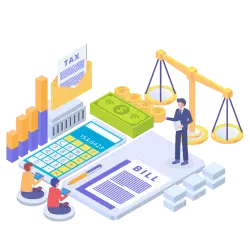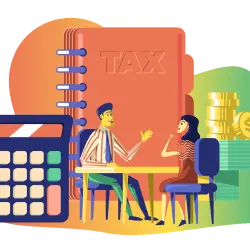TABLE OF CONTENTS
- What You Need to Know About Venmo and US Tax Law
- Which Venmo Payments Are Exempt From Taxes?
- Why Does Venmo Need Your Tax Information?
- Tax Responsibilities for Accepting Business Payments via Venmo
- Will Venmo Provide Additional Tax Documents?
- Do You Need a Tax Professional to Help Navigate Taxes?
- Simplify Your Taxes With Tailored Payment Solutions
- Venmo Tax Law FAQs
Roughly one in five Americans—62.8 million users, or 22.3% of the population—use Venmo [1] Oberlo. “How Many People Use Venmo (2023-2027).” Accessed on May 21, 2024. Given this popularity, it’s no surprise many business owners consider using a Venmo business account to make shopping easier for their customers. However, payment apps like Venmo have also opened up an exciting conversation regarding Venmo tax law in the US. So, what new forms might you need this tax season? And what payments classify?
Since 2022, the IRS has required payment processing apps like Venmo and PayPal to report all business account transactions over $600 annually. In this guide, we’ll discuss the ins and outs of American tax law as a business owner using Venmo and look at tips to help you comply with those tax obligations.
What You Need to Know About Venmo and US Tax Law

The increased use of P2P payment platforms—and their business account alternatives—has created a possible tax loophole for those receiving income via these platforms. To prevent this, the IRS has tightened laws about using platforms like Venmo for business.
Previously, the IRS required anyone who received payments via Venmo for services or goods over $20,000 annually (or 200 transactions) to report their income. However, the IRS has significantly tightened the reigns for the 2023 tax year and beyond. New regulations require anyone receiving income from goods or services over $600 annually through Venmo to report their income. This includes freelancers, sole proprietors, home businesses, handyman jobs, and hairdressing services.
Note that these tax rules apply to all payment platforms, not solely to Venmo. Switching platforms does not affect your tax responsibilities.
To comply with IRS regulations and assist business account users in meeting Venmo tax law, the platform now issues a Form 1099-K to all qualifying users. But to do this, Venmo will require your tax information.
Which Venmo Payments Are Exempt From Taxes?
Venmo offers explicitly personal and business accounts so that users can keep private and business transactions separate. Venmo prohibits users from using personal accounts to receive business payments; therefore, it assumes all payments to your account are business income.
However, the platform provides an option for payers to indicate the transaction. This allows them to mark transactions as a business or personal payment, streamlining income reporting and preventing personal payments from being listed as taxable. Remember that if you occasionally receive personal payments through your business account, you may need to prove to the IRS that these payments are unrelated to your business.
So, what exactly is taxable, and what is not? Any income you receive from a business transaction is taxable. Personal payments, such as transferring money to friends or family for a shared meal or birthday gift, are not.
Refunds are also not taxable. For example, say you purchased $100 worth of stock for your business. The supplier lets you know that they cannot fulfill your order. They may then refund the purchase to your Venmo business account. This payment received from the supplier is not taxable.
Why Does Venmo Need Your Tax Information?
Simply put, the IRS requires Venmo to confirm taxpayer information for users who receive business income payments over the state reporting threshold. Therefore, Venmo needs your tax information to prepare a Form 1099-K.
Suppose you don’t provide the requested information. In that case, Venmo is legally required to execute backup withholding, when a payer withholds a percentage of your business income payments to ensure you pay federal income taxes.
To that end, Venmo sends the withheld amount—currently set by the IRS at 24%—from your payments to the IRS every month. The withheld funds are then reported on Form 1099-MISC and other applicable tax forms.
Finally, that documentation gets sent to you and the IRS by Venmo. Although you cannot get these funds returned, you can claim the amount withheld as a credit on your federal income tax return.
Backup withholding typically applies when the account holder has not provided a correct taxpayer identification number (TIN), such as a Social Security number or an employer identification number (EIN). To avoid payment withholding, you must provide your tax ID in the Venmo app—an easy fix for merchants overall.
Finally, Venmo starts backup withholding before you reach the $600 threshold. So, don’t think you can wait until you get to $600 before submitting your tax details. You should do this as soon as you open your business account.
Tax Responsibilities for Accepting Business Payments via Venmo
The moment you start accepting business payments on Venmo—or any other P2P payment platform, for that matter—you are responsible for reporting that income. You should receive a Form 1099-K from Venmo detailing your account activity and taxable business income; however, even if you don’t receive documentation, you are still liable to report your business income to the IRS.
Failing to file income tax can result in substantial penalties that have noteworthy financial implications for you and your business. If you are self-employed, a freelancer, or a contractor, the company paying you must also file a 1099-NEC Form with the IRS (and provide you with a copy). The form reports non-employee compensation; this applies regardless of the method the client chooses to pay you, whether it’s via Venmo, PayPal, or even cash. Similarly, if you are paying freelancers or contractors, you must provide them (and the IRS) with a 1099-NEC.
Forms aside, it’s imperative that you keep your detailed financial records. The forms you receive from Venmo or clients may contain errors; it’s therefore not ideal to depend on them solely for your tax reporting purposes. Always compare the form details the financial or business institution provided against your records. This helps you determine inconsistencies and dispute errors before filing your tax return.
If Venmo includes personal transactions that aren’t taxable on the issued Form 1099-K, you need to request a corrected form from Venmo and file a correction with the IRS. Not addressing this mistake means the IRS will assume the income is taxable and tax you accordingly. You can avoid this by indicating on the app whether a transaction is personal or business at the time of payment.

Substantiating Expenses
The IRS considers Venmo payments akin to cash. Therefore, business owners must have extra documentation—such as invoices, receipts, or expense reports—supporting business reasons for these payments.
For instance, paying a caretaker through Venmo for office cleaning expenses must be accompanied by an invoice or receipt that includes the amount and description of the cost. This allows you to substantiate the deductions if the IRS ever questions them.
Will Venmo Provide Additional Tax Documents?
Venmo sends business profile owners and individuals a Form 1099-K when they meet the reporting threshold; additionally, anyone who sells cryptocurrency on Venmo will receive a Gains and Losses Statement.
If you haven’t sold cryptocurrency or used Venmo for business income or expense payments, you can still access your account statements on Venmo’s website. Users who don’t get Venmo notifications about downloading tax documents or can’t find them on the website are likely below the reportable threshold; in this case, download your account statements instead if needed for reporting purposes.
To comply with US tax law, Venmo makes 1099-K forms available to qualifying users around January 31st, while Gains and Losses Statements are ready by February 15th. By default, Venmo issues tax documents electronically to qualifying users.
If you signed up for Venmo before July 22, 2022, you may receive tax documents by mail; however, you can opt into electronic delivery in the Venmo app. If you close your Venmo account after receiving payments that exceed the IRS’s reporting threshold, you should receive tax documents for the activity by mail.
Do You Need a Tax Professional to Help Navigate Taxes?

While you don’t need to hire a tax professional to keep up with Venmo rules or tax law, general assistance can be incredibly helpful in navigating your tax obligations—especially if your situation is complex or you’re unsure about your responsibilities.
Consider the following reasons you may want to consult a tax professional:

Complex Tax Situations
If you have complex financial arrangements, such as owning multiple businesses or receiving various sources of income, investments, or significant deductions, a tax professional can help ensure you identify all eligible deductions, credits, and exemptions while correctly reporting your income. They worry about keeping everything organized so you can focus on your to-dos.

Changing Tax Laws
Tax laws change frequently, and keeping up with all the updates can be challenging. Tax professionals stay informed about new regulations, exemptions, and deductions, reducing the risk of errors and maximizing your tax benefits.

Time Savings
Preparing taxes can be time-consuming, especially if you lack familiarity with the tax code. Hiring a tax professional can save you time and help alleviate the stress of preparing and filing your taxes.

Audit Assistance
If you receive an audit notice from the tax authorities, a tax professional can guide you through the process, help gather the necessary documentation, and represent your interests during the audit.

Peace of Mind
A tax professional can help minimize the risk of errors or discrepancies that could result in penalties or audits.
It’s important to note that while a tax professional can provide valuable guidance, the ultimate responsibility for your taxes remains with you. You should still ensure that you understand your tax situation, review your return, and ask questions if anything is unclear. Using a payment service that integrates with accounting software is critical to effectively managing your finances and avoiding the penalties and headaches of non-compliance.
Simplify Your Taxes With Tailored Payment Solutions
Accurate financial tracking is essential for meeting your business goals and Venmo tax law. If you find juggling personal, business, incoming, and outgoing transactions with Venmo challenging, it may be time to consider a credit card processing solution built with your company in mind.
PaymentCloud offers tailored payment processing solutions to meet your specific needs, along with a dedicated account manager who curates multiple options based on your requirements. Additionally, we integrate seamlessly with standard business tools like accounting software, streamlining tracking and minimizing your financial and tax challenges.
Venmo Tax Law FAQs
What classifies a payment as “goods and services”?
Any product or service you provide for an income is “goods and services,” whether you are a freelance designer or an artist, have a catering business from home, run a restaurant, etc. As a default, all payments into a Venmo business account are automatically classified as “goods and services.”
What is a backup withholding date?
The backup withholding date is the monthly date that Venmo sends your backup withholding funds to the IRS. You can find this on your Venmo profile. If you provide the required tax details before the next withholding date, Venmo will not send backup withholding to the IRS.
How does Venmo deliver tax documents?
Venmo generally delivers tax documents electronically; however, users may receive them by mail in certain situations. If you receive your documents by mail, you can request electronic delivery by opting for “Go paperless” under the “Tax documents” tab in the Venmo app. Venmo account statements are available by accessing your online profile.




